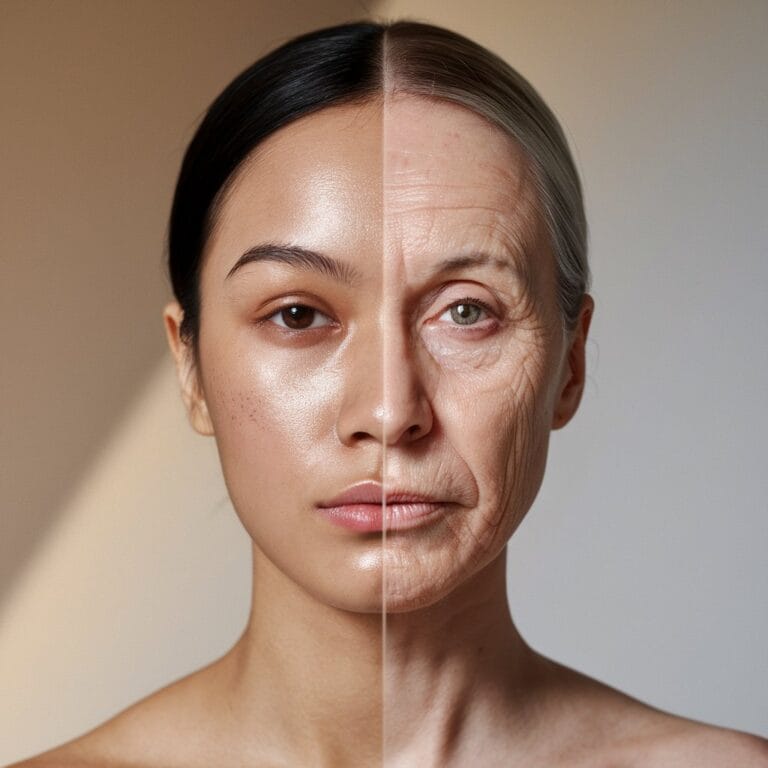FREE SHIPPING OVER $50
Stop the Clock: This Protein Hack Might Be The Key to Aging Backwards
Aging—it’s the one thing we all have in common, and yet, so many of us are on a quest to slow it down or even reverse it. Whether it’s fine lines, wrinkles, or that general feeling of “I’m not 25 anymore,” the search for the fountain of youth is eternal. But what if the secret isn’t in some elusive elixir but a simple tweak to your diet? Enter the “protein hack,” a science-backed approach that might just help you stop the clock.
Why Protein is the Cornerstone of Anti-Aging
Protein isn’t just for gym rats. It’s the building block of life, playing a vital role in repairing tissues, maintaining muscle mass, and producing enzymes and hormones. As we age, our body’s ability to utilize protein efficiently decreases, leading to muscle loss, slower healing, and sagging skin.
The good news? Upping your protein intake strategically can address many of these aging concerns. But this isn’t about eating just any protein—it’s about using specific hacks to maximize the benefits.
The Role of Collagen: The “Youth Protein”
Collagen is often dubbed the most important protein for anti-aging. Why? It’s the primary protein in your skin, bones, and connective tissues. As you age, your body produces less collagen, leading to wrinkles, joint pain, and brittle hair.
How to Boost Collagen:
- Collagen Supplements: Hydrolyzed collagen peptides are easily absorbed and have been shown to improve skin elasticity and hydration.
- Bone Broth: This old-school remedy is packed with natural collagen.
- Vitamin C: Pairing collagen supplements with vitamin C-rich foods like oranges or bell peppers can enhance absorption.
Leucine: The Muscle Preserver
Leucine, an amino acid found in protein-rich foods, is key to maintaining muscle mass as you age. Muscles aren’t just for show—they help you burn calories, maintain balance, and stay mobile.
Best Sources of Leucine:
- Chicken breast
- Eggs
- Greek yogurt
- Fish
Studies suggest that consuming about 2-3 grams of leucine per meal can maximize muscle protein synthesis, keeping your body strong and resilient.
Protein Timing: When You Eat Matters
It’s not just about how much protein you eat, but when you eat it. Distributing your protein intake evenly throughout the day helps your body utilize it better.
- Morning: Start with a protein-packed breakfast like eggs or a smoothie with whey protein.
- Post-Workout: Have a high-protein snack to help with muscle recovery.
- Evening: A lighter protein option, like grilled fish, can promote overnight muscle repair.
The Protein-Fiber Combo for Gut Health
Your gut plays a massive role in how well you age, from nutrient absorption to inflammation control. Pairing protein with fiber can enhance gut health and reduce bloating.
Protein-Fiber Pairing Ideas:
- Grilled chicken with quinoa and broccoli
- Lentil soup with a side of whole-grain bread
- Greek yogurt with chia seeds and berries
Common Mistakes When It Comes to Protein
Even with the best intentions, some protein habits can backfire. Here’s what to avoid:
- Relying Solely on Protein Powders: While convenient, they often lack the full spectrum of nutrients found in whole foods.
- Skipping Protein at Breakfast: This is the meal where many people skimp, missing an opportunity to kickstart their metabolism.
- Not Drinking Enough Water: Protein metabolism generates waste, so staying hydrated is crucial.
Real Results: What Science Says
A growing body of research supports the anti-aging benefits of protein:
- Improved Skin Elasticity: Collagen supplements have been shown to reduce wrinkles and boost skin hydration within 8-12 weeks.
- Muscle Preservation: Older adults who consumed higher protein diets preserved muscle mass better than those who didn’t.
- Increased Longevity: Studies suggest that diets rich in plant-based proteins, like legumes and nuts, are associated with longer lifespans.
How to Get Started with the Protein Hack
Ready to stop the clock? Here’s how to incorporate the protein hack into your daily routine:
- Calculate Your Needs: Aim for 0.8 to 1 gram of protein per pound of body weight.
- Diversify Your Sources: Mix animal and plant proteins for a balanced approach.
- Prep Smart: Batch-cook protein-rich meals to save time during the week.
The Bottom Line
Aging backward might sound like science fiction, but with the right protein hacks, it’s closer to reality than you think. By optimizing your protein intake and timing, you can improve your skin, strengthen your muscles, and boost your overall vitality.







